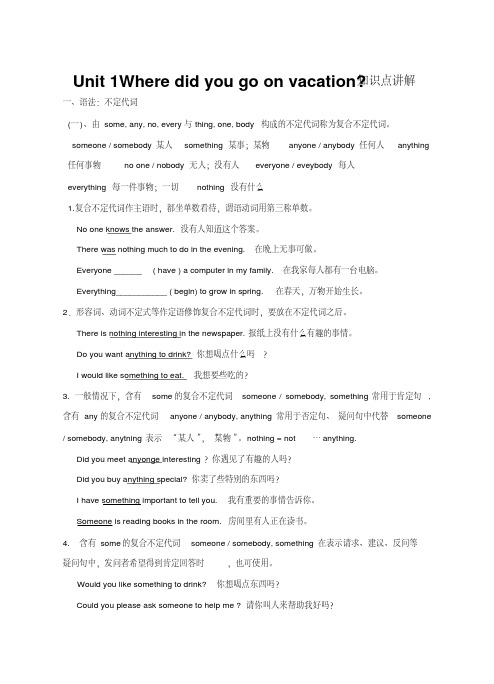最新人教版英语八年级上册unit 1 where did you go on vacation 第3课时
新2024秋季八年级英语上册人教版Unit1Wheredidyougoonvacation?听课记录

新2024秋季八年级人教版英语上册Unit 1 Where did you go on vacation? 听课记录一、教学目标(核心素养)•语言能力:学生能够流利地使用一般过去时描述自己的假期经历,包括地点、活动和感受。
•思维品质:通过对比不同学生的假期经历,培养学生的批判性思维和创新能力。
•文化意识:增进对不同旅游文化的了解,培养学生的跨文化交流能力。
•学习能力:通过合作学习,提高学生自主学习和解决问题的能力。
二、导入教师行为:•教师展示一系列关于世界各地风景名胜的图片,每张图片都配以简短的英文描述。
•提问:“Which place do you like best? Why? Have you ever been there or dream of going there?” 引导学生分享自己的喜好和旅行愿望。
•引出话题:“Many of us have wonderful memories of our vacations.Today, let's share our stories and learn about others' experiences.”学生活动:•学生认真观看图片,积极思考并回答教师的问题。
•部分学生分享了自己的旅行经历或梦想中的旅行目的地,激发了课堂气氛。
过程点评:•图片导入直观生动,有效激发了学生的学习兴趣和参与度。
•通过分享个人经历,学生自然地进入了学习状态,为后续的学习活动做了良好的铺垫。
三、教学过程(一)词汇预热教师行为:•在黑板上列出与假期旅行相关的词汇,如“vacation”, “beach”, “mountain”,“visit”, “enjoy”等,并领读几遍。
•通过快速问答的方式,检查学生对这些词汇的理解和掌握情况。
学生活动:•学生跟读词汇,并尝试在脑海中构建与这些词汇相关的场景。
•积极参与快速问答,展示自己的词汇掌握情况。
过程点评:•词汇预热为后续的阅读和写作活动打下了坚实的基础。
人教版英语八年级上册 Unit 1 Where did you go on vacati

go out 出去
last month 上个月
take photos 拍照
quite a few 相当多;不少
have a good time 玩得开心 go shopping 去购物
of course 当然;自然
seem to do sth. 似乎做某事;好像做某事
keep a diary 写日记
Unit 1 Where did you go on vacation?
单元知识盘点
常用短语
on vacation 度假
go to the mountains 去爬山
stay at home 待在家里 go to the beach 去海滩
summer camp 夏令营
play volleyball 打排球
经典句型
1. ...I bought something for my father. ……我给我爸爸买了一些 东西。
2. Everything tasted really good! 所有的食物尝起来都很美味! 3. How did you like it? 你认为它(三亚)怎么样? 4. It was sunny and hot, so we decided to go to the beach near our
5. |烟台中考|—Look at my new smartphone.
—Wow, it’s so cool. When and where C you
it?
A. do; buy
B. have; bought
C. did; buy
D. have; had
6. —I have seen The Adventures of Alice in Wonderland. What
人教版英语八年级上第一单元Unit1Wheredidyougoonvacation知识点梳理

人教版英语八年级上第一单元Unit1Wheredidyougoonvacation知识点梳理Unit 1 Where did you go on vacation?知识梳理一、词型转换Section A1.wonder →(adj.) wonderful2.I →(反身代词) myself3.you →(反身代词) yourself4.yourself →(pl.) yourselves5.seem →(pt.) seemedSection B1.activity →(pl.) activities2.decide →(n.) decision3.try →(pt.) tried4.bike →(同义词) bicycle5.build →(n.) building6.difference →(adj.) different7.like →(反义词) dislike8.below →(反义词) above二、短语归纳Section A1.go to Central Park 去中央公园2.on vacation 在度假3.buy something special 买特别的东西4.meet someone interesing 遇见有趣的人5.go out with someone 和某人一起出去6.take quite a few photos 拍相当多的照片7.most of the time 大多数时间8.go shopping 去购物9.keep a diary 记日记10.of course 当然;自然Section B1.have a good time 玩得高兴;过得愉快2.go to the beach 去海滩3.feel like 感觉像4.the houses of the Chinese traders 中国商人的房子5. a lot of new buildings 许多新的建筑物6.in the past 在过去7.over an hour 一个多小时8.too many people 太多的人9.get to the top 到达顶部10.because of the bad weather 因为不好的天气11.one bowl of fish 一碗鱼肉12.another two hours 另外两个小时13.the top of the hill 山顶14.learn something important 学习重要的东西Self Check1.go to the countryside 去乡下2.in the shopping center 在购物中心3.have a fun time 玩得高兴;过得愉快4.after three hours 三个小时以后5.keep going 一直走6.twenty minutes later 20分钟后重点句子1.Where did you go on vacation?你去哪儿度假的?2.Long time no see.好久不见。
最新人教版新目标八年级上册英语《Unit 1 Where did you go on vacation》教学设计

Unit1 Where did you go on vacationSection B(1a-1e)一.教学目标知识目标:1.key words: delicious,exciting,terrible,expensive,cheap,boring2.key sentences:(1)Where did Lisa go on vacation?(2)Did she do anything special there?Did she buy anything for her best friend?Did Lisa like her vacation?(3)How was/were...?3.运用be+形容词来评价事物能力目标:1.进行听力训练,提高综合听说能力。
2.能够利用自评和互评的评价标准,提高自己的听说能力。
情感目标:1.让学生学会分享过去发生的事件。
2.通过课堂活动,培养学生的合作精神。
3.向学生提供体验学习成功的多种机会,使其增强自信心。
学习策略:1.听力练习,训练学生学习和使用有选择的听的策略。
2.设计Pairwork, Groupwork等活动,培养和训练他们的合作策略。
3.通过自评和互评活动,使学生不断调整改进自己的学习策略。
文化意识:通过听力内容帮助学生了解香港。
二.教学重难点教学重点:The vocabulary:delicious,exciting,terrible,expensive,cheap,boringTarget language:Where did Lisa go on vacation?Did she do anything special there?Did she buy anything for her best friend?How was/were...?教学难点:1.熟练地谈论过去发生的事件2.运用be+形容词来评价事物三.教学过程Step 1Leading in1.Greetings.2.T:Where did you go on vacation?S:I went to summer camp.T:Did you do anything special there?S:Yes,I...T:Did you buy anything for your parents or friends?S:Yes,I bought...for.../No,I bought nothing.T:How was/were...?S:It was/They were...3.Present the adjectives:delicious,exciting,terrible,expensive,cheap,boring Step 2Pre-taskWork on 1a and 1b.1.Look at the six pictures.2.Match the words with the pictures.4.Check the answers.Step 3While-taskWork on 1c and 1d.1.Make students read the questions in 1c.2.Play the recording for the first time. And say:Listen to the tape. Lisa is talking about her vacation. Complete the four questions.①Where did Lisa go on vacation?She went to Hong Kong.②Did she do anything special there? What was it?__________________________________________________③Did she buy anything for her best friend?__________________________________________________④Did Lisa like her vacation?__________________________________________________3.Play the recording a second time. Students complete the task in 1d.What did Lisa say about ------?her vacation great the people ________the fun park ________ the food ________the stores __________4.Correct the answers.5.Ask the students to listen to the tape and repeat .Then let them read the tape scripts.Step 4Post-taskWork on 1e.1.Pairwork. Get the students to work in pairs about Lisa's vacation. You canbegin your questions with:Where did...?What did...?Did she...?How was...?How were...?2.Ask 3 or 4 students to ask and answer the questions .For example:A: Where did Lisa go on vacation?B: She went to Hong Kong.A: What did she do?B: She went to a fun park.A: Did she go shopping?B: Yes, she did.A: How were the stores?B: They were very expensive.A: How were the people?B: They were really friendly.A: How was the food?B: It was delicious.3.Groupwork. Let the students say about Lisa's vacation . First give the students time to practice it by themselves. Then let them work in groups .At last choose several students to show it individually.For example:Lisa went to Hong Kong with her family on vacation. She went to a fun park. It was really exciting. She bought something for her best friend. The stores were very expensive. The people there were really friendly. Lisa’s parents have some friends there.They had dinner at their friends ’ home. The fo od was delicious. Everything was excellent. And they had a good time.Step 5. Exercises一..根据括号所给单词,句意或首字母完成句子。
最新人教版英语八年级上册Unit1-Where-did-you-go-on-vacation

--I visited my friends.
我去拜访了朋友。
2) 与go to the mountains结构类似的词组还有: go to the beach 去海边 go to summer camp 去夏令营
go to New York City 去纽约市
go on vacation 去度假
stay at home 呆在家中
We're staying in the same hotel.
我们住在同一家旅馆。
2) home与house, family的区别
home指“家”这个概念, 包括“住处”和
“家人”。 house则指“房子”、“住宅”,
侧重于建筑结构。family则指“家庭成员”。
回答: Yes, 主+did. / No, 主+didn’t.
在过去时态中, 无论主语是第几人称,
是单数还是复数, 助动词一律用 did。如:
--Did you/he/she/they go to the park
last night?
--Yes, I/he/she/they did.
3. I stayed at home. 我呆在家里。
露营地, 阵营
Where did they go on vacation?
They went to the museum. 博物馆
Where did you go on vacation?
பைடு நூலகம்
I went to Beijing City.
Where did he go on vacation?
He went to the mountains.
※当family作整体概念时, 谓语动词用单数;
人教新目标八年级英语上册Unit1Wheredidyougoonvacation知识点讲解

Unit 1Where did you go on vacation?知识点讲解一、语法:不定代词(一)、由some, any, no, every与thing, one, body 构成的不定代词称为复合不定代词。
someone / somebody 某人something 某事;某物anyone / anybody 任何人anything 任何事物no one / nobody 无人;没有人everyone / eveybody 每人everything 每一件事物;一切nothing 没有什么1.复合不定代词作主语时,都坐单数看待,谓语动词用第三称单数。
No one knows the answer. 没有人知道这个答案。
There was nothing much to do in the evening. 在晚上无事可做。
Everyone ______ ( have ) a computer in my family. 在我家每人都有一台电脑。
Everything___________ ( begin) to grow in spring. 在春天,万物开始生长。
2.形容词、动词不定式等作定语修饰复合不定代词时,要放在不定代词之后。
There is nothing interesting in the newspaper.报纸上没有什么有趣的事情。
Do you want anything to drink?你想喝点什么吗?I would like something to eat. 我想要些吃的?3. 一般情况下,含有some的复合不定代词someone / somebody, something常用于肯定句,含有any的复合不定代词anyone / anybody, anything常用于否定句、疑问句中代替someone / somebody, anytning表示“ 某人”,“某物”。
新人教版八年级英语上册复习短语笔记资料Unit 1 Where did you go on vacation
Unit 1 Where did you go on vacation?1.go on vacation = go for a vacation=take a vacation=spend one’s holiday 去度假2.stay at home待在家里stay well = stay healthy=keep in a good health=keep fit 保持健康3.summer camp 夏令营go to summer camp去参加夏令营go to winter camp去参加冬令营•4.go to the mountains 去爬山go to the beach 去海滩go to New York City 去纽约市go to Central Park去中央公园5. visit sb. = pay a visit to sb. = call on sb. 拜访某人visit sp. = pay a visit to sp. = call at sp参观某地6. meet anyone interesting 见任何有趣的人do anything special做任何特别的事情go anywhere interesting去任何有趣的地方7. study for tests为考试而学习study for the English test为英语考试而学习8. go out 外出;(灯、火)自动熄灭Put out 灭火9. a few +可数名词复数一些;几个a little +不可数名词少量的;一点quite a few = many 许多(后接可数名词复数)quite a little = much 许多(后接不可数名词)a lot of - lots of许多;大量的(后接可数名词复数或不可数名词)take quite a few photos 照许多照片take photos with sb. 和某人照相take photos of sb. 给某人照相10. most of the time 大部分时间most of the students这些学生中的大部名(特指,有范围)most students大部分学生(泛指,无范围)11. taste really good尝起来真的很好taste great尝起来棒极了sound great听起来好极了12. of course = sure = certainly 当然13. in the countryside 在农村in the shopping center 在购物中心14. keep a diary写日记;记日记diary entry 日记记载;日记记录15. the fun park娱乐公园;开心乐园have great fun其乐无穷have fun doing sth.做某事开心16. arrive in sp. = get to sp. = reach sp.=get to sp.到达大地方arrive at sp. = get to sp. = reach sp. =get to sp. 到达小地方17. decide to do sth. = decide on doing sth.=make a decision to do sth.决定做某事decide on sth.在某事上下决心18. try paragliding尝试滑翔伞运动try to do sth.设法做某事;努力做某事try doing sth.试着做某事have a try 试一试19. feel like...有......的感觉;感受到......20. have something very special 吃一些非常特别的东西ride bikes to Georgetown 骑自行车去乔治敦21. from 100 years ago 自一百年以前in the past在过去in the past few years在过去几年里22. enjoy doing sth.享受/喜欢做某事enjoy oneself = have a good time= have fun =have a fun time玩得开心;过得愉快23. make a difference=play an important role有影响;起(重要)作用24. walk up to..朝......走过去walk back home步行回家walk to school步行上学25. wait for…等待wait for sb. to do sth.等待某人去做某事26. rain hard = rain heavily 下大雨rain cats and dogs下倾盆大雨27. because of +名词/动名词因为......because +从句因为......28. another two hours = two more hours 再过两小时29. make notes=take notes做记录;做笔记30. each other互相(用于两者之间)one another互相(用于三者或三者以上)31. at the airport 在机场at the station 在车站32. on one’s way home在某人回家的路上on one ‘ s way to school在某人上学的路.33. bring back 带回来34. on our school trip 在我们学校郊游的旅途中go on a trip=travel to sp.去旅行35. find out查明;弄清楚36. keep doing sth.继续做某事;一直做某事不停地做某事;持续做某事37. go on继续往前走;继续;发生go on doing sth.继续做同一件事go on to do sth.继续做另一件事go on with sth.继续某事38. up and down上上下下;来回;到处;彻底地39. in excitement 兴奋地in surprise = surprise sb.=to one’s surprise惊讶地40. come up上升,升起;靠近,走近;长出41. forget about sth.忘了某事forget to do sth.忘记去做某事forget doing sth.忘记做过某事。
八年级英语上册 Unit 1 Where did you go on vacation Section A教案人教新目标版
Unit 1 Where did you go on vacation? Section A1.Where did you go on vacation?你去哪里度假了?⑴这是一个由疑问副词where引导的特殊疑问句。
where用来询问地点和场所,放在句首,其后跟一般疑问句。
如:Where did you go yesterday?你昨天去哪里了?⑵go on vacation意为“去度假”。
如:I want to go on vacation in Hainan this winter.今年冬天我想去海南度假。
He will go on vacation with his family.他要与家人一起去度假。
2.visited my uncle 看望了我叔叔visit在此为及物动词,意为“拜访;探望”,后接表示人的名词或代词。
visit还可以意为“参观;游览”,后接表示地点的名词。
如:I visited my grandmother last week.上周我去看望了我的外婆。
Do you want to visit Shanghai?你想游览上海吗?【拓展】⑴visit可用作名词,意为“访问;参观;拜访”。
如:This is my first visit to Provence。
这是我第一次到普罗旺斯参观。
⑵visitor意为“参观者;游客”。
如:These visitors come from China.这些参观者来自中国。
3.buy anything special 买特别的东西⑴buy及物动词,意为“买;购买”。
其过去式为bought。
如:It takes a lot of money to buy a house.买一座房子要花一大笔钱。
【拓展】buy sth.for sb.=buy sb.sth.意为“给某人买某物”。
如:I find the story very boring.我发现这个故事太无聊了。
最新人教新目标八年级上册英语Unit 1 Where did you go on vacation全单元教案
自主学习方案1.自学生词,并记住拼读及拼写。
2.预习课本,找出重点短语和句子。
(见学案自学导练内容)3.读记后完成自学导练内容。
课堂导学方案Step 1 情景导入(3分钟)教师通过师生交流,导入新授话题。
T:What did you do last Friday?S: I went hiking.T: Where did you go on vacation?S: I went to the mountains.(beach, camp, skate, swim)环节说明:以学生假期旅行为话题进行会话开始本节课的教学,引起学生的学习兴趣和用英语表达的欲望。
Step 2 完成教材1a—1c1.教师领读1a中的单词和词组,学生识记单词和词组且将活动和图片中的人物匹配。
(3分钟)2.看1a中的图,听录音,完成1a、1b的听力任务。
(3分钟)3.听录音,跟读。
(2分钟)4.结对练习1c中的对话,然后让2~3对学生表演,并用1a和1b 的信息编练对话。
(6分钟)参考案例A: Where did Tim go on vacation?B:He went to the beaches.5.小结训练。
(1分钟)( A )—What _________ you _________last night?—I watched TV.A. did;doB.do;doC. did;doingD. are;do环节说明:听说结合,第一时间向学生传达语言目标,通过结对对话练习和小结训练,使语言目标得以强化。
Step 3 完成教材2a—2c的任务1.听录音,在2a相对应的方框中写上Grace, Kevin和Julie度假的地方,集体核对答案。
(3分钟)2.听录音,完成2b任务,集体核对答案。
(3分钟)3.跟着录音机朗读听力材料。
(3分钟)4.让学生利用2b中的信息仿照2c的形式练习,并要多组学生表演。
(4分钟)5.小结训练。
(3分钟)( B )(1)I didn’t go out with _________yesterday.A. someoneB. anyoneC. anythingD. anywhere( D )(2)—Did you go to the zoo?—_________.A. Yes, I didn’tB. Yes, I doC. No, I didD. Yes, I did( A )(3)I often went out _________my mother.A. withB.atC. inD. on环节说明:通过听、说、读、写训练让学生掌握一般过去时态的一般疑问句及部分不定代词,使学生的口语表达能力在这一环节中得到提升。
人教版英语八年级上册 Unit 1 Where did you go on vacation
4. went to summer camp __d__ 5. went to the mountains __c__
6. went to the beach __a___ 7. visited museums ___e___
stayed at home went to New York City
visited my uncle went to summer camp went to the mountains
went to the beach visited museums
待在家里 去纽约市 拜访叔叔 参加夏令营
登山 去海滩 参观博物馆
events.
➢Where did you go on vacation? 去度假 ➢What did you do on your vacation? ➢Did you have a good time?
Lead-in
A:Where did you go on vacation? B:I went to the beach.
A:Where did you go on vacation? B:I went to New York City.
A:Where did you go on vacation? B:I went to the mountains.
Can you say other vacation acwtievnitttioessuymomuerdciadmopn
Summary
— Where did you go on vacation? — I went to… —Did you…? —Yes, I did. / No, I didn’t.
